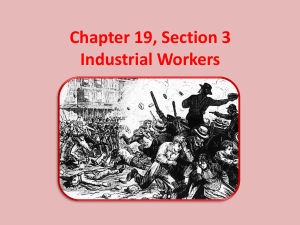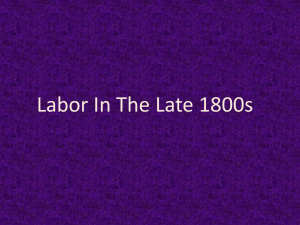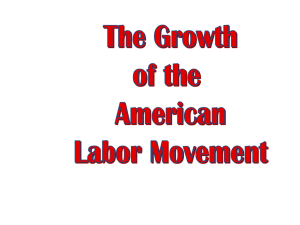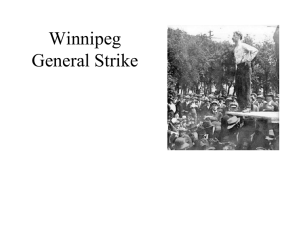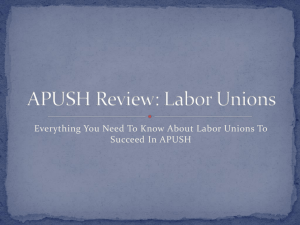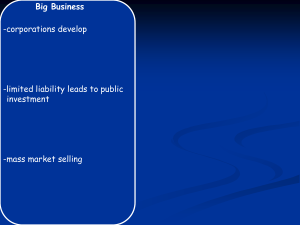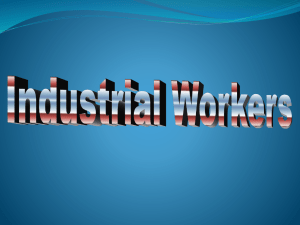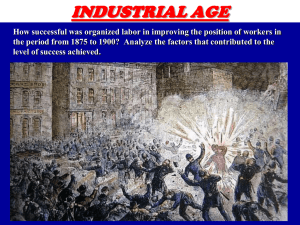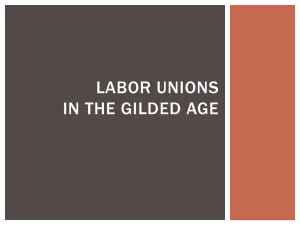cartoon analysis- industrialization
advertisement
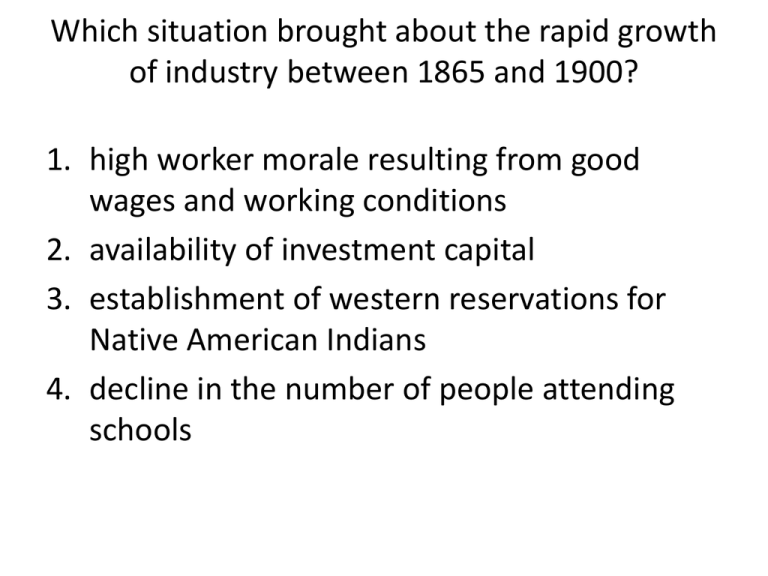
Which situation brought about the rapid growth of industry between 1865 and 1900? 1. high worker morale resulting from good wages and working conditions 2. availability of investment capital 3. establishment of western reservations for Native American Indians 4. decline in the number of people attending schools In the decades after the Civil War, the major result of the shift from single proprietorship to corporate organization was that business was able to 1. make more efficient use of natural resources 2. concentrate on improving the quality of manufactured goods 3. provide workers with higher wages 4. raise large sums of money Businesses formed trusts, pools, and holding companies mainly to 1. increase profits by eliminating competition 2. offer a wide range of goods and services to consumers 3. provide employment opportunities for minorities 4. protect the interests of workers A negative effect of holding companies (trusts), mergers, and pools on the United States during the late 19th century was that these combinations 1. encouraged the Federal Government to spend more than its income 2. reduced the need for labor unions 3. decreased competition between businesses 4. ended United States participation in international trade The 19th-century philosophy of Social Darwinism maintained that 1. the government should have control over the means of production and the marketplace 2. all social class distinctions in American society should be eliminated 3. economic success comes to those who are the hardest working and most competent 4. wealth and income should be more equally distributed • http://www.youtube.com/watch?v=D9vOUhkmtSw • Robber Barons or captains of industry? LABOR ONE SEES HIS FINISH UNLESS GOOD GOVERNMENT RETAKES THE SHIP Mark Hanna- iron and coal industrialist Philip Armour- meatpacking industrialist “What a Funny Little Government”, by Horace Taylor for the September 25, 1899 issue of The Verdict THE TRUST GIANTS POINT OF VIEW “WHAT A FUNNY LITTLE GOVERNMENT” “The Standard Oil Octopus” Keppler 1904 Puck “The Standard Oil Octopus” Joseph Keppler - 1889 political cartoon "The Bosses of the Senate", “The Protectors of our Industry” 1883 Samuel Ehrhardt, ‘History Repeats Itself: The Robber Barons of the Middle Ages and the Robber Barons of Today’, Puck, c. 1889 Labor Unions Emerge: • Working Conditions: – Six or seven days a week – 12+ hours – No benefits (vacation, sick time, unemployment, injury) • Dangers: – injuries common; dangerous equipment – 675 deaths a week in ’82 • Wages: – to survive, women and children often had to work • child labor: – 20% of boys, 10% of girls work full time- no education • sweatshops: – done in tenement houses; – women and children (27 cents for 14 hour day- children) Union Types of workers it organized Knights of Labor ALL WORKERS (men, women, minorities, immigrants, skilled unskilled) American Federation of Labor (craft unions) American Railway Union (industrial union) Tactics used (strikes, collective bargaining, arbitration) Goals- types of reforms sought Level of success? Mostly arbitrationthird party solves dispute Skilled workers Collective bargainingLEADER: negotiation Samuel Gompers between labor and management Strikes used 8-hour work day Equal pay for men and women Declines after failure of strikes “bread and butter issues” Higher wages Shorter work weeks Quite successful All workers in a specific industry (railroad) Unskilled, semiskilled, some skilled Higher wages Declines after failure of a strike LEADER: Eugene V. Debs Strikes Why was the AFL more successful than the Knights of Labor? • Knights of Labor– too diverse a group of workers- different goals – unskilled workers easy to replace • American Federation of Labor- (AFL) – workers in same craft- same goals – skilled workers have more power Collective Bargaining • negotiation between labor and management to settle disputes Homestead Strike • http://www.history.com/videos/andrewcarnegie-and-the-homestead-strike • Pullman Strike • http://video.answers.com/impact-of-thepullman-strike-300994006 In both the Homestead and Pullman Company Strike, what role did the government play? Did they support the workers or big business? • Government sends in troops to end the strike, orders Debs to end the strike. • ****supports business In re debs • The government does have the power to order Debs to stop strike • Article one, Section 8 of Constitution• - interstate commerce; post office • (RR strike interfered with commerce and the delivery of the mail) • • What is the ILGWU: • International Ladies’ Garment Union • • What was the “Uprising of 20,000”? What was the outcome? • A successful seamstress strike in 1909 • • Describe the Triangle Shirtwaist Fire of 1911: • 1911 fire- all doors locked; 146 women burn to death • • What positive result did the tragedy have in New York? • New York sets up a task force to improve safety conditions Homestead Strike: • Conditions that led to the strike: – Announcement to cut wages at Carnegie Steel. • Tactics used by both sides (labor and management): – Labor: go on strike; attack plant- occupy it and keep it closed – Management: hires scabs, hires “Pinkertons” (armed guards) to protect plant • Role of the state and/ or federal government: – National Guard sent in to reopen plant • Outcome of the strike: – after 5 months, union gives in to company; loses public support; – (45 years until steel workers unionize again) Pullman Strike • Conditions that led to the strike: – Pullman lays off more than half of work force; cuts pay of rest – Still charges the same for rent • Tactics used by both sides (labor and management): – Labor: strike called; Debs asks for arbitration; ARU boycotts Pullman trains; go after strikebreakers (scabs) – Management: hires scabs; refuses arbitration • Role of the state and/ or federal government: – President Cleveland sends in federal troops to end strike – Courts issue an “injunction” (order) to halt the strike – Debs is arrested for refusing the injunction • Outcome of the strike: – Pullman fires strikers – Strikers “blacklisted”- no RR company will hire them
